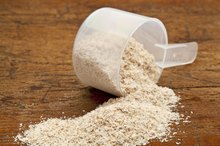What does fact checked mean?
At Healthfully, we strive to deliver objective content that is accurate and up-to-date. Our team periodically reviews articles in order to ensure content quality. The sources cited below consist of evidence from peer-reviewed journals, prominent medical organizations, academic associations, and government data.
- Medline Plus: Blond Psyllium
- "European Journal of Clinical Nutrition": The Effects of Psyllium on Lipoproteins in Type II Diabetic Patients; G. Sartore, et al; 2009
- "European Journal of Clinical Nutrition": The Effects of Psyllium on Lipoproteins in Type II Diabetic Patients; G. Sartore, et al; 2009
The information contained on this site is for informational purposes only, and should not be used as a substitute for the advice of a professional health care provider. Please check with the appropriate physician regarding health questions and concerns. Although we strive to deliver accurate and up-to-date information, no guarantee to that effect is made.
How Much Fiber in Psyllium Husk?
Psyllum is a fiber which is soluble in water and is commonly found in products used to provide bulk to stools. The seeds and husks are used as they contain a high percentage of fiber and mucilage. Diets high in fiber have been shown to reduce cholesterol and can increase the quality and quantity of stools. It will also help relieve bouts of diarrhea. Before taking psyllium products, you should first speak to your doctor as psyllium has been known to interfere with some medications.
History
Psyllium has been used worldwide for hundreds of years. In India, it is still used as part of the Ayurveda medical system. It was approved in the 1990s for use as a product to lower cholesterol by German health advisors. Psyllium and products containing psyllium were approved in 1998 by the U.S. FDA to have a label with health claims.
- Psyllium has been used worldwide for hundreds of years.
- Psyllium and products containing psyllium were approved in 1998 by the U.S. FDA to have a label with health claims.
Plant Information
Psyllium Husk Allergy
Learn More
Plantago ovata, the scientific name of psyllium, is a fast growing annual plant. Within 60 days of germination, it can grow to its full height, between 12 to 18 inches, and be covered with small white flowers that grow from the base of the plant in shoots. It takes an additional 60 to 70 days for the plant to mature and produce seeds. The plant likes very light, sandy loam soil that has good drainage, and it prefers to grow in climates that provide cool dry air. Psyllium is currently being cultivated in Europe, Russia, India, U.S. and several other countries throughout the world.
- Plantago ovata, the scientific name of psyllium, is a fast growing annual plant.
- Within 60 days of germination, it can grow to its full height, between 12 to 18 inches, and be covered with small white flowers that grow from the base of the plant in shoots.
Health Benefits
According to the University of Maryland Medical Center, the mucilage found in psyllium husks is very effective in treating constipation, diarrhea and as a stool softener to aid with hemorrhoids 1. There was a study published in the October 2009 issue of "European Journal of Clinical Nutrition" that suggested that regular use of psyllium can reduce triglycerides in patients with type II diabetes 4. Psyllium husks contain 34 percent insoluble fiber and 66 percent soluble fiber while the seeds contain 19 percent fiber and 18.8 percent protein.
Herbal Benefits
Pros & Cons of Metamucil
Learn More
In Western herbology, psyllium is used to treat dry constipation conditions because it contains a large content of mucilage. Mucilage will absorb water in the gastrointestinal tract and swell creating a moist bulk in the stools. According to herbalist Michael Tierra, the husk of psyllium is most beneficial.
Cautions
Taking psyllium husks is considered safe, according to Medline Plus, when taken with plenty of liquids 3. Common side effects are gas and bloating, while less common effects include headaches, cough and sinus problems. There is a chance that the use of psyllium could reduce the absorption of or negatively interact with several medications, therefore, it is advisable to speak to your physician before taking products containing psyllium husks or seeds.
- Taking psyllium husks is considered safe, according to Medline Plus, when taken with plenty of liquids 3.
- There is a chance that the use of psyllium could reduce the absorption of or negatively interact with several medications, therefore, it is advisable to speak to your physician before taking products containing psyllium husks or seeds.
Related Articles
References
- University of Maryland Medical Center: Psyllium
- Alternative Field Crops Manual: Psyllium
- Medline Plus: Blond Psyllium
- "European Journal of Clinical Nutrition": The Effects of Psyllium on Lipoproteins in Type II Diabetic Patients; G. Sartore, et al; 2009
- Brum JM, Gibb RD, Peters JC, Mattes RD. Satiety effects of psyllium in healthy volunteers. Appetite. 2016;105:27-36. doi:10.1016/j.appet.2016.04.041
- Jalanka J, Major G, Murray K, et al. The effect of psyllium husk on intestinal microbiota in constipated patients and healthy controls. Int J Mol Sci. 2019;20(2). doi:10.3390/ijms20020433
- Abutair AS, Naser IA, Hamed AT. Soluble fibers from psyllium improve glycemic response and body weight among diabetes type 2 patients (randomized control trial). Nutr J. 2016;15(1):86. doi:10.1186/s12937-016-0207-4
- Akbarian SA, Asgary S, Feizi A, Iraj B, Askari G. Comparative study on the effect of and seeds on anthropometric measures in nonalcoholic fatty liver patients. Int J Prev Med. 2016;7:114. doi:10.4103/2008-7802.191865
- University of Michigan Medicine. Psyllium.
- Icahn School of Medicine at Mount Sinai. Psyllium.
Resources
- "The Way of Herbs"; Michael Tierra; 1998
Writer Bio
Catherine Smith has been writing professionally since 2000. She runs a client-based wellness office in Bastrop, Texas. She specializes in pain and stress management using herbs and alternative medicine She received her doctorate in natural health with a concentration in herbal studies from Clayton College of Natural Health.









